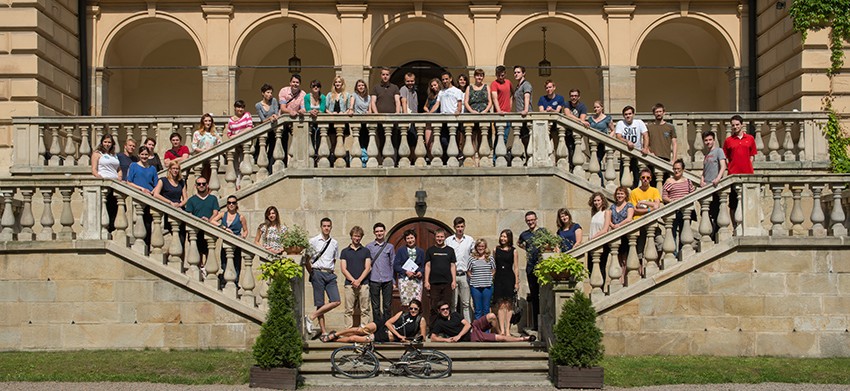
The human face of Central and Eastern Europe shows itself through sharing cultural identity by telling common stories which we all understand. Can it strengthen the ties connecting us?
Storytelling is the simplest and the oldest form of sharing human knowledge. On the other hand, creating our personal narratives is a form of creating our own consistent package of identity. Truly, these personal stories are very much formed by external forces – historical events, socio-historical changes. If our countries share the same historical burdens, went through similar socio-historical changes, is it possible that the personal (parallel) narratives of their citizens will meet somewhere on the way?
Three writers and Central European citizens, three different stories to tell. András Forgách from Hungary, Silvia Ruppeldtová from Slovakia, Lavon Barscheuski from Belarus – current and former participants of Visegrad Fund’s Literary Residency Program hosted by Villa Decius Association – stayed with us to detect Visegrad Narrative. I can tell we never found it.
“Narrative as a word is a trick to trick the others to think that we know everything” – said András Forgách, explaining what the verb “to narrate” means for him. Then he added: “we should be careful with grand but simple narratives as they mostly cover ideology.” When it comes to András’ own artistic practices he said: I like to change my narrating position in my novels or short stories, but the background of them stays mostly biographical.
“My biggest inspiration to be a storyteller was listening to Slovak mythic tales and reading the stories of ancient Greek mythology” – said Silvia Ruppeldtová. She also spoke about the problem of Hungarian-Slovak misunderstanding, which, in her opinion comes from the hugely differing historical narratives dominating in the two countries public and scientific discourses: “We are of the same mentalities with Hungarians, the same lunatics, only our historical narratives are different” – she said.
Lavon Barscheuski was emphasizing the role of media in reshaping the narratives. He remembered the “cult of victims of war” which used to be the most important narrative in the communist regime. There was a great pressure from soviet propaganda to use this narrative – he said.
Tracing common eastern policy of V4
Taras Voznyak, Ukrainian culture expert, political scientist and Jan Piekło, literary historian and director of the Institute Bridges to the East were the co-lecturers of the next lecture titled Light comes from the East.
Voznyak spoke about the changes and shifts in the world power system after the end of the cold war as the main explanation to Russia’s current behavior. “While the EU needs to compete with China and the US, Putin tries to demolish the current system and put Russia back to the game” – he said – “and apparently the west noticed nothing from this”. According to Voznyak Ukraine’s wake-up “after dreaming too much” was a surprise for both Russia and the Ukrainian society itself. “The people in the Donetsk region are making up their minds now” – Voznyak added – “they are choosing between the past and the future.”
“Without controlling Ukraine it would be impossible for Putin to rule the region” – continued the lecture Jan Piekło, reasoning why Ukraine is of big importance for Putin. The Russian invasion of Ukraine, as both Voznyak and Piekło agreed that using this term is legitimate in this case, puts a big pressure on Visegrad countries and the Baltic states, who will sooner or later have to take their position in the question of having NATO involvement in the Ukrainian-Russian war or not. This is where the common eastern policy of Visegrad Cooperation is apparently missing, as the Czech Republic, Slovakia and Hungary are rather against the NATO involvement while Poland, the biggest V4 country, seems supportive in this question.
Eszter Neuberger








































